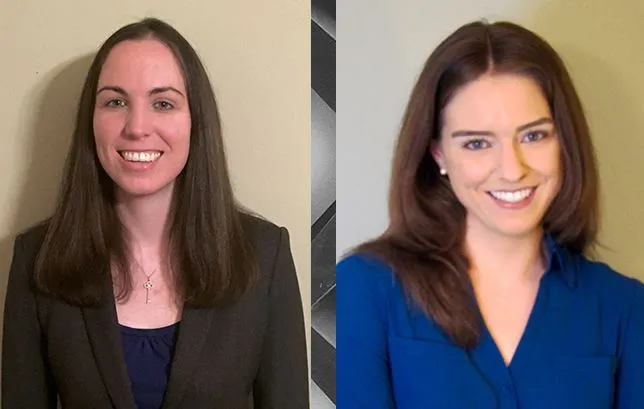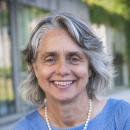Fellowship Wins: Mara Easterbrook, '16, Receives Polikoff-Gautreaux; Jamie Schulte, '15, Receives Skadden

Two members of the Law School community—women who have been lauded for both their intellect and their commitment to public service—won highly coveted two-year fellowships last week that will enable them to take on social justice issues in Chicago. The Skadden Foundation awarded Jamie Schulte, ’15, a fellowship to launch an educational-rights program supporting at-risk Chicago youth, and Business and Professional People for the Public Interest (BPI) awarded a Polikoff-Gautreaux Fellowship, which takes its name from a Law School alumnus and his landmark public housing lawsuit, to Mara Easterbrook, ’16.
“We are enormously proud of both Jamie and Mara,” said Dean Thomas J. Miles, the Clifton R. Musser Professor of Law and Economics. “They are using their legal skills, drive, and talent to address important issues and help the underserved, and we know they will be tremendous assets to their organizations.”
Both Schulte and Easterbrook have devoted themselves to public interest work, said Susan J. Curry, the Law School’s Director of Public Interest Law and Policy.
“How absolutely right it is for them to be rewarded with these prestigious fellowships,” she said. “And let’s not forget another reward they will receive: the chance to work for premiere Chicago public interest organizations that are doing great work, and where young attorneys receive important mentorship, allowing them to develop their legal skills, take exciting risks, and create strong professional networks.”
Schulte, a former teacher, will launch her two-year project next fall at LAF, Chicago’s largest legal aid provider. She will directly represent at-risk youth in special education and disciplinary matters in Chicago’s growing “options schools.” She will also obtain and analyze data about these relatively new alternative programs, which serve expelled, academically unsuccessful, or otherwise at-risk students. Many of the more than three dozen options schools, affiliated with the Chicago Public Schools but mostly run by outside organizations, often use online coursework and shortened hours, Schulte said.
“More and more Chicago students are attending options schools, but we don’t know much about them,” she said. “The kids who end up in these schools are some of the most vulnerable in Chicago. They’ve been involved with the justice system, or they’ve dropped out of school and now they’re back. This population has some of the greatest educational and social service needs, but it's not clear, at least from the outside, that many of the options schools have the resources to meet these needs."
Schulte said her intent is not to tear down options schools, but to help make information about the programs more widely available, advocate for students in the programs—some of whom she’s concerned have been “pushed out” of traditional schools because it will be easier for them to graduate from options schools—and educate families about their rights.
“The Skadden Fellowship Program could not have picked a better fellow,” said Emily Buss, the Mark and Barbara Fried Professor of Law. “Jamie combines exceptional legal skills with a deep commitment to serving young people, particularly young people growing up in poverty in Chicago. Jamie’s advocacy in disciplinary and special education hearings, which will allow her to make use of both her legal and former teaching skills, could have a dramatic impact on the life chances of a group of especially vulnerable teens.”
Schulte, who is currently clerking for Judge Gregg Costa on the Fifth Circuit Court of Appeals, graduated with High Honors last spring. She devoted hours during law school to public service and to the needs of youth: she worked on the Criminal and Juvenile Justice Clinic; completed the Pro Bono Service Initiative; served as vice president of Neighbors; and worked as a teaching assistant to high school students who participated in Buss’s high school/law school Juvenile Justice class. Last spring, Schulte received the Ann Watson Barber Outstanding Service Award, which honors exceptional contributions to the quality of life at the Law School.
“One thing is absolutely clear, given Jamie’s performance while a law student at UChicago, is that she will excel in every single aspect of legal aid lawyering,” Curry said. “She will be a committed and compassionate advocate for her clients, and she will continue her outstanding written and oral advocacy record as well. I guarantee you that LAF attorneys are celebrating this announcement.”
The Skadden Fellowship Program, described as "a legal Peace Corps" by The Los Angeles Times, was established in 1988 to commemorate the firm's 40th anniversary. It provides funding for graduating law students to pursue their own projects providing legal services to the poor, the elderly, the homeless and the disabled, as well as those deprived of their civil or human rights. Seventeen other Law School students or graduates have received a fellowship since the program began; Kara Ingelhart, ’15, is currently working in the Midwest Regional Office of the Lambda Legal Defense and Education Fund on a program that serves low-income LGBTQ youth with juvenile or criminal records.
Taking an Interdisciplinary Approach to Social Justice
Easterbrook—who also has been recognized for her deep commitment to public service—will join BPI, a nonprofit law and policy center devoted to addressing social justice issues related to housing, education, criminal justice, urban poverty, and quality of life.
“I was thrilled—it’s an amazing opportunity,” she said. “I really appreciate the way that BPI works on Chicago’s social justice issues in an interdisciplinary way. They take pressing issues like housing, public education and criminal justice, and they work on those together instead of just treating them in isolation. This fellowship allows me to advocate on behalf of underserved and disadvantaged populations through legal work, policy advocacy, and coordination with local stakeholders."
While working last summer at the Law Office of the Cook County Public Defender, Easterbrook saw how different areas of public interest law interact. "I saw how (indigent criminal defense) necessarily involves issues like housing insecurity and unemployment and community development in Chicago,” she said. “All those things come together at BPI.”
Curry said the fellowship will give Easterbrook’s public interest career a strong start.
“BPI is consistently a leader in tackling the most compelling issues of social justice and quality of life in Chicago,” Curry said. “And it is sweeter still that she will join BPI as the prestigious Polikoff-Gautreaux Fellow, a program that takes one part of its name from our distinguished alumnus Alexander Polikoff, ’53, and the other part from Polikoff's landmark public housing lawsuit.”
The Polikoff-Gautreaux Fellowship was created in 1999 to honor Polikoff, who served as BPI's Executive Director for 29 years, and Dorothy Gautreaux, the public housing activist who gave her name to his landmark lawsuit. Gautreaux et al. v. Chicago Housing Authority was the nation's first major public housing desegregation lawsuit.
"We’re thrilled that Mara will be joining us next year," said Adam Gross, ’95, who joined BPI 20 years ago as a Skadden Fellow and is now their Director of Affordable Housing. "With her big brain, her extraordinary range of legal experience, and her passionate commitment to social justice, we know she'll make an enormous contribution to BPI's criminal justice reform work."
Easterbrook, who works on the Criminal and Juvenile Justice Clinic, first became interested in public interest work when she served a volunteer coordinator on President Obama’s first campaign during a gap year between high school and college. In addition to the Public Defender’s Office, Easterbrook has worked as a summer associate at Jenner & Block, a law clerk at the Texas Civil Rights Project, and as a legal intern at the National Immigrant Justice Center in Chicago. As a UChicago undergrad, she volunteered as a public health teacher on Chicago’s South Side. During law school, she has completed 285 hours of pro bono work as part of the Pro Bono Service Initiative, worked as a staffer on Law Review and served as vice president of the Spring Break of Service, which she attended during her 1L and 2L years.
“Mara combines a truly first-rate intellect with a passionate commitment to improve the world around her,” said Justin Driver, Professor of Law and Herbert and Marjorie Fried Research Scholar. “She will make a valuable contribution to communities that are in dire need of the skills she has developed and showcased at the University of Chicago.”
Curry said she is eager to see how the careers of both women unfold.
“I am fully confident that they will do great things with their fellowships,” Curry said. “And I am sure they will both develop meaningful and rewarding careers as public interest lawyers.”

